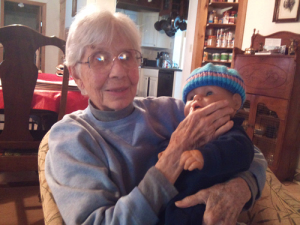by Wigg, Johanna M., Ph.D., Brandeis University, 2006, 171 pages; AAT 3243767
Abstract (Summary)
 This dissertation project focuses on the lives of elders living with dementia, specifically their relationships with one another. The research includes data collected within one long-term, dementia care facility. The data was collected over a period of approximately six months, including nearly four hundred hours of observation within the research environment. In addition, this research project was informed by my nine years of experience at The Vicarage by the Sea, Inc., cohabitating with elders living with dementia.
This dissertation project focuses on the lives of elders living with dementia, specifically their relationships with one another. The research includes data collected within one long-term, dementia care facility. The data was collected over a period of approximately six months, including nearly four hundred hours of observation within the research environment. In addition, this research project was informed by my nine years of experience at The Vicarage by the Sea, Inc., cohabitating with elders living with dementia.
The research design utilizes Glaser and Strauss’s grounded theory methodology (1967). Through observation, field notes were compiled specific to the elders’ relationships with outsiders as well as one another, including their patterns of social engagement and modes of
communication. Through analysis of the data, elements of a culture of dementia developed.
There was a continuum of communication expressed by the residents, incorporating spoken language, body language, hand gestures,
facial expression, verbal utterances, noise making and touch. While the abilities of the residents varied, the interpersonal interaction among the residents persevered. Types of interactions among the residents were defined, including attachment, conflict, instrumental and expressive interactions.
In the final analysis, there appeared to be a culture of dementia within the setting I observed. While the setting was heavily defined and closely monitored by care providers, the residents living on the unit related to one another in complex and unique manners. Their relationships were certainly affected by the institutional controls of the setting. Nevertheless, due to the complex effects of living with progressive
dementia (mid to late stage), such as loss of cognitive competency in language usage, etc., the residents living on the unit maintained interpersonal relationships with those living among them. These relationships appeared to offer normative aspects of interpersonal human interaction, including affection and care giving, as well as anger and social isolation.
When a “culture of dementia” is recognized among elders living with progressive neurological diseases, the social setting supporting the culture must be redefined and conditioned to sustain interpersonal relations among those with mid to late stage dementia. In addition, definitions of meaningful interaction among these individuals must also be redefined.


